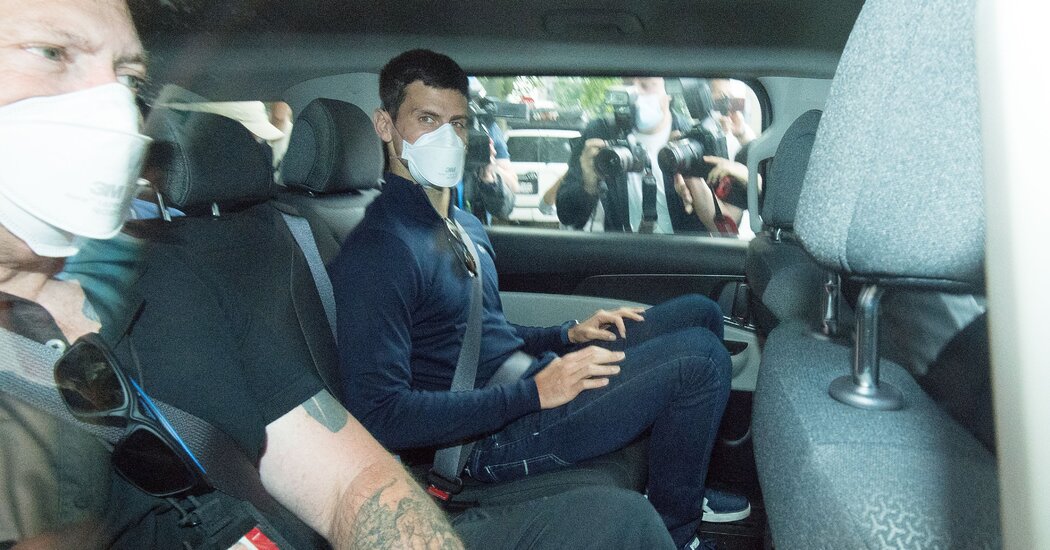Novak Djokovic, the top player in men’s tennis and its leading vaccine skeptic, had his visa canceled for the second time by the government of Australia, where he had arrived Jan. 5 hoping to defend his Australian Open title. The tournament begins on Monday.
Here’s a look at how the standoff has unfolded:
A surprise exemption gave Djokovic an apparent chance to avoid Australia’s tough vaccination rules.
Djokovic has won the last three Australian Open men’s singles championships, and a record nine in his career. But he has received scrutiny for his unscientific beliefs, including his support for a claim that positive emotions can purify toxic water or food, and he has shunned coronavirus vaccines.
Last year, the Australian Open announced that participants in this month’s tournament would have to be fully vaccinated, in line with requirements for entering the country. Djokovic’s participation was seen as unlikely until he announced Jan. 4 that he would play after receiving an exemption. It was later learned that his exemption was based on a recent coronavirus infection.
The federal government stopped Djokovic at the border.
Djokovic was stopped at the airport in Melbourne late on Jan. 5 after flying from Spain via Dubai, United Arab Emirates. He was questioned for hours at the airport before being sent to a quarantine hotel.
Prime Minister Scott Morrison of Australia, who has faced criticism over the government’s Covid-19 response, announced that Djokovic’s entry had been denied because he was unvaccinated. Federal officials said that a previous coronavirus infection was not valid grounds for the vaccination exemption granted by Australian tennis officials and local authorities in Victoria, the state where the tournament is held.
Djokovic, who was taken to a quarantine hotel pending his departure, immediately filed a legal appeal.
Djokovic won an appeal, but questions soon arose.
On Monday, after Djokovic had spent five days at a hotel for refugees and asylum seekers, a judge ruled that he had been treated unfairly at the airport, denied a promised chance to contact his lawyers or Australian Open officials, and reinstated his visa.
But documents released as part of the legal proceedings raised questions about Djokovic’s actions.
Records showed that he took a coronavirus test at 1:05 p.m. on Dec. 16 in Belgrade, Serbia, and received the positive result seven hours later. But social media posts showed that he had attended two public events on the day he sought his test, and also a tennis event a day later in Belgrade, where he presented awards to children. And Franck Ramella, a reporter with the French sports newspaper L’Equipe, wrote this week that when he conducted an interview with Djokovic on Dec. 18, he did not know that the athlete had just tested positive.
Questions also arose over whether Djokovic had made a false statement on his entry form to Australia when he said that he had not traveled internationally in the 14 days before his flight from Spain. Social media posts showed him in Serbia on Christmas Day.
Djokovic acknowledged mistakes.
In a statement on Wednesday, Djokovic said he was not yet aware that he had tested positive when he attended the children’s event, and acknowledged that he had made a poor decision not to cancel the interview with the French journalist. He said that a member of his support team had made a “human error” when filling out his paperwork.
But the statement, which read as both a late request for leniency and an explanation for irresponsible behavior, may have come too late. By then, Australia’s immigration minister, Alex Hawke, was already giving serious consideration to using his powers to cancel the visa for the second time.
Australia’s immigration minister revoked Djokovic’s visa.
On Friday, Hawke said in a statement that he was canceling Djokovic’s visa on the grounds of “health and good order,” adding that it was in the public interest to do so. Djokovic’s lawyers quickly appealed, with the Australian Open starting on Monday and his ability to compete for a men’s record 21st Grand Slam title in jeopardy.
A three-judge panel agreed to hear the case.
Lawyers for Djokovic and the Australian government laid out their arguments in court documents ahead of a Sunday hearing.
Hawke told Djokovic’s lawyers in a letter filed with the court that he canceled Djokovic’s visa out of concern that the tennis star’s presence in Australia could stoke anti-vaccine sentiment and lead to “civil unrest.”
Djokovic’s lawyers argued that Hawke did not act rationally in that assessment. Nicholas Wood, one of the lawyers, said the minister did not take into account the impact of forcing the player out of the country.
The panel, granted by Justice David O’Callaghan on Saturday at the request of Djokovic’s lawyers, means that the court’s decision on the case cannot be appealed.


























